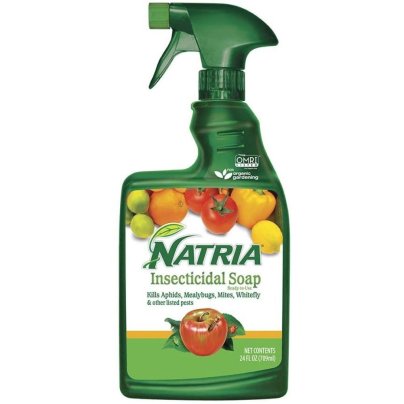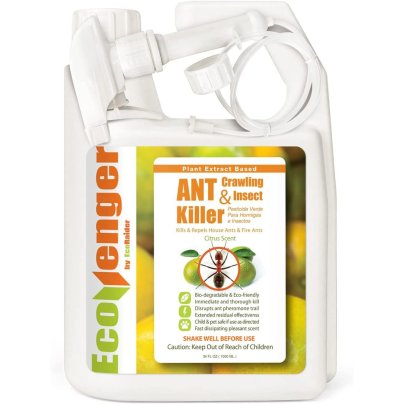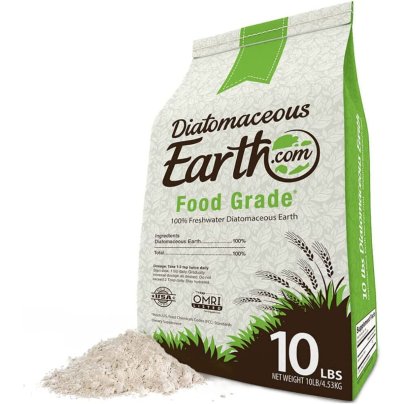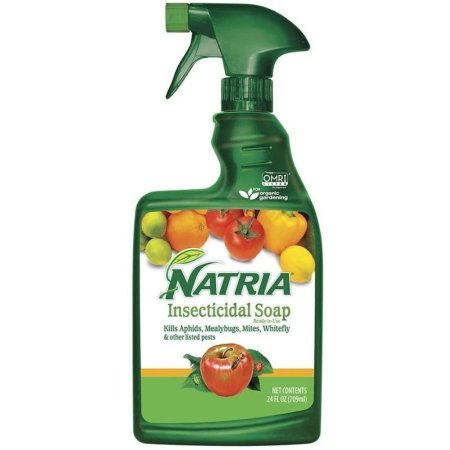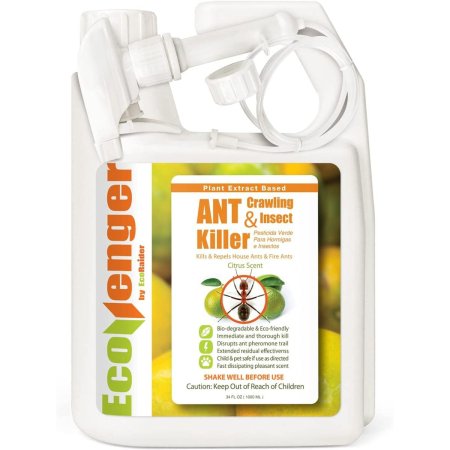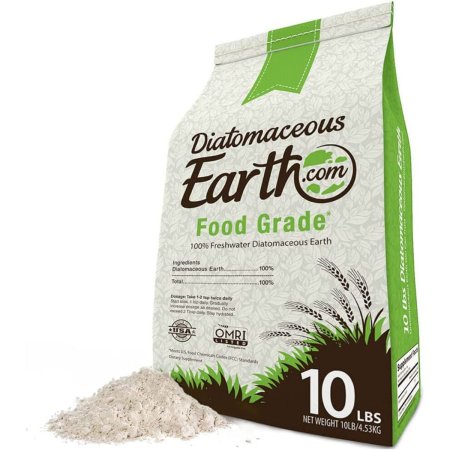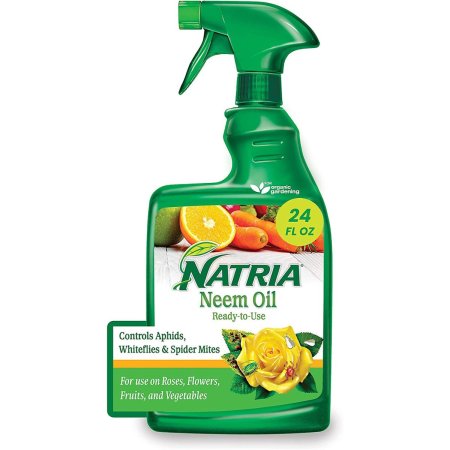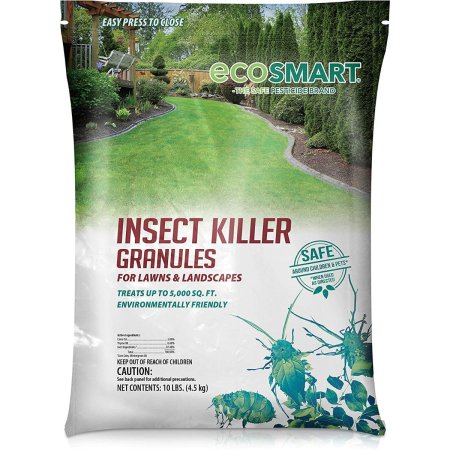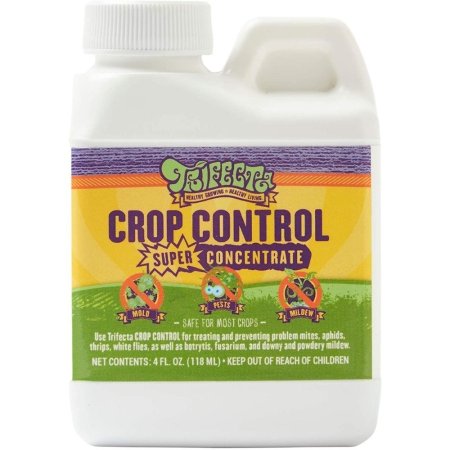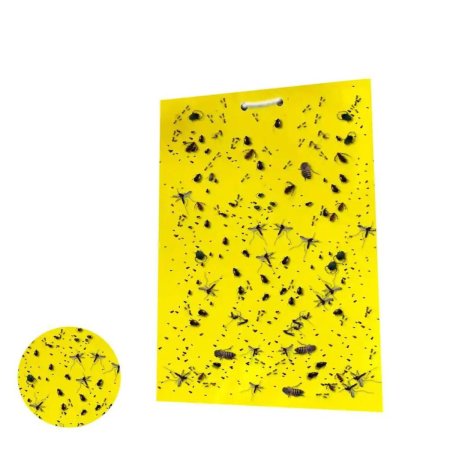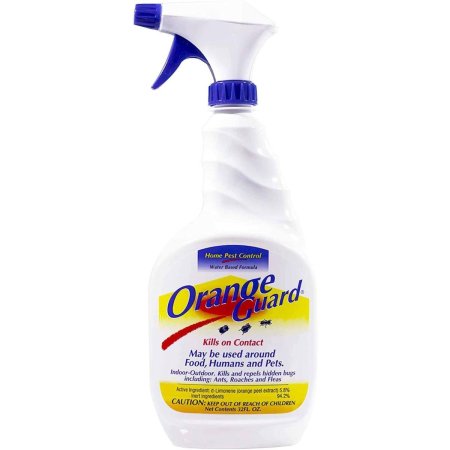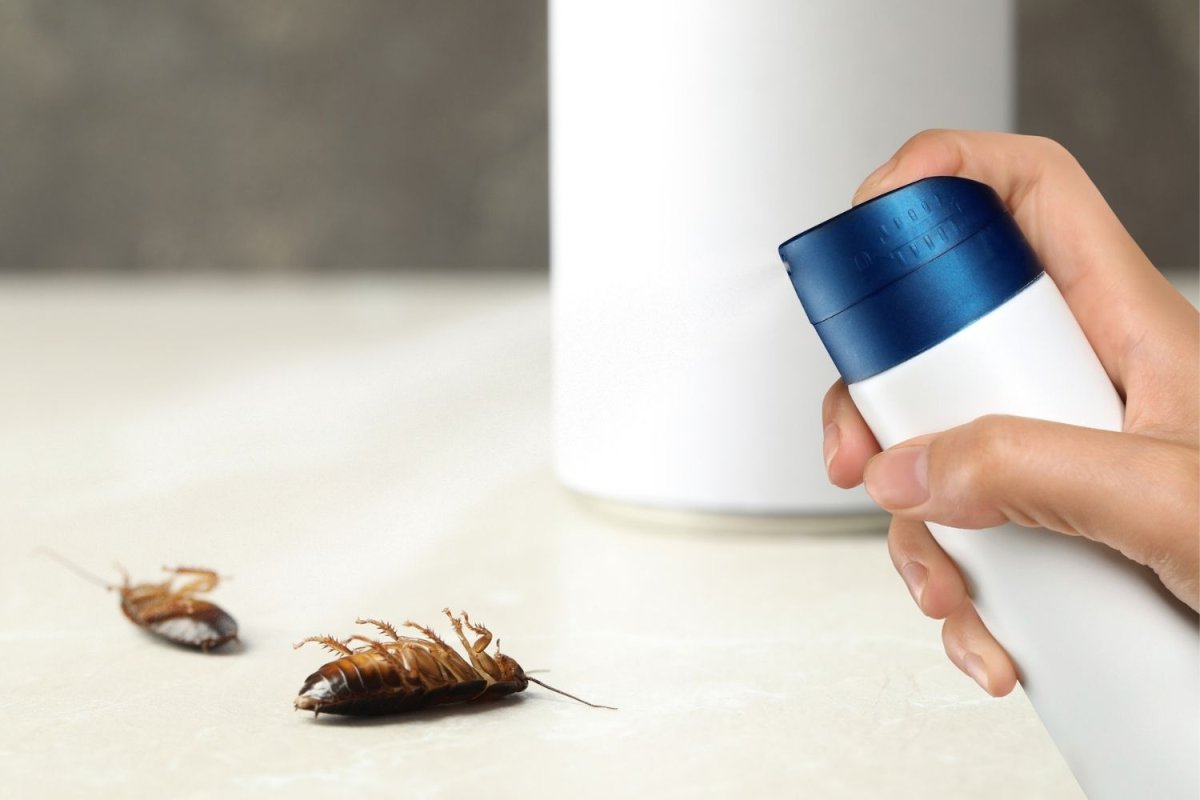
We may earn revenue from the products available on this page and participate in affiliate programs. Learn More ›
Indoor insects can pose problems throughout the year. There could be insects living in the walls and behind and under the appliances, or feeding on the houseplants or produce (from those who enjoy indoor gardening). Insecticides are an effective way to treat potential or ongoing insect infestations in the home. Natural or nontoxic insecticides can safely take care of an insect problem without exposing the plants, pets, or family to strong chemical products.
The best insecticide for the home depends on the location of the infestation or point of entry and the type of insects that are infesting. Not all insecticides work on every type of insect. If unsure of the type of bug that’s plaguing the home, shoppers may want to go with a broad-spectrum formula that covers a variety of species. Take a look at the top products below to get an idea of the options available to keep the home bug-free.
- BEST OVERALL: Natria 706230A Insecticidal Soap Organic Miticide
- BEST BANG FOR THE BUCK: EcoVenger Ant & Crawling Insect Killer
- BEST POWDER: DiatomaceousEarth.com Food Grade Diatomaceous Earth
- BEST SPRAY: Natria 706250A Neem Oil Spray
- BEST GRANULES: EcoSmart Insect Killer Granules
- BEST CONCENTRATE: Trifecta Crop Control Super Concentrate All-in-One
- BEST TRAPS: Lightsmax Dual-Sided Yellow Sticky Traps
- BEST FOR INDOOR USE: Orange Guard Home Pest Control Spray

Before You Buy Insecticide
Regardless of whether the goal is to find an insecticide for indoor or outdoor pest control, many products rely heavily on powerful chemicals that can be harmful to the environment and the local wildlife. Before selecting the first pest control product that promises to get rid of insect pests immediately, it’s important to research the product and the effect its active ingredient can have on the ecosystem.
Another factor to keep in mind is that if indoor and outdoor plants need to be treated, a natural insecticide would be the safest option. Getting rid of insect pests should be a secondary goal when treating indoor and outdoor plants; otherwise, it could become too risky to harvest and consume any of the fruit and vegetable plants the user is growing.
Take some time to research alternative powder, granule, and liquid insecticide products to find an effective treatment with a natural active ingredient that isn’t harmful to the environment.
How We Chose the Best Insecticides
Selecting the top insecticides for this list required extensive research on a wide range of products, as well as a deeper look into the risks involved with using insecticidal products. A significant effort was made to find highly effective insecticides that didn’t rely on harmful active ingredients. With this goal in mind, the top products that made this list use natural ingredients with a limited impact on the ecosystem while still remaining effective against invading pests.
Additionally, the insecticides chosen for the top picks encompass a variety of formulations, including sprays, traps, powders, concentrates, and granules. This was purposefully done in order to provide a versatile selection to treat a range of insect species. The longevity and application method of each insecticide considered for the list was also noted and assessed before finalizing the top products.
Our Top Picks
This list includes some of the best insecticide options for indoor use based on price and efficacy. Select the most suitable product for the home and its insect problem.
Best Overall
Natria 706230A Insecticidal Soap Organic Miticide
Pros
- Comes in a ready-to-use spray bottle
- Effective against more than 20 insect species
- Suitable for use on indoor and outdoor plants
- Safe for use in homes with kids or pets
Cons
- Lasts only up to 2 weeks
Product Specs
- Type: Spray
- Active ingredient: Potassium salts of fatty acids
- Length of efficacy: 2 weeks
Green thumbs who grow herbs or spices in window gardens can use Natria’s organic miticide to protect their plants from invading insects. With this insecticide spray, users can control adult, larvae, and nymph stages of aphids, mealybugs, mites, whiteflies, beetles, and caterpillars using an organic solution that won’t harm the plants.
The insecticidal and miticidal formula uses potassium salts of fatty acids (also known as soap salts) to dehydrate affected insects rapidly, killing them in just a few minutes. The 24-ounce bottle of ready-to-use insecticide should be used biweekly or weekly, as necessary.
Get the Natria 706230A insecticide on Amazon or at The Home Depot.
Best Bang for the Buck
EcoVenger Ant & Crawling Insect Killer
Pros
- Eliminates ants, crickets, fleas, millipedes, and other crawling insects
- Remains effective as a repellent after initial use
- Pleasant citrus scent
- Safe for use around kids and pets
Cons
- Does not kill the nest
Product Specs
- Type: Spray
- Active ingredient: Lemongrass oil, geraniol, cedarwood oil, and sodium lauryl sulfate
- Length of efficacy: 4 weeks
It isn’t necessary to invest in costly chemical products to treat pest infestations. Simply opt for this affordable insecticide spray by EcoVenger. The natural formulation of lemongrass oil, geraniol, cedarwood oil, and sodium lauryl sulfate kills crawling pests on contact but also remains as an effective repellent for up to 4 weeks.
This spray is safe for use in homes with kids and pets, and it even leaves behind a pleasant citrus scent instead of a noxious chemical odor. The insecticide kills ants, crickets, fleas, millipedes, earwigs, midges, spiders, and more crawling insects. However, it should be noted that the spray kills only pests that it comes into contact with, so it isn’t effective at destroying the nest.
Get the EcoVenger insecticide on Amazon or EcoVenger.
Best Powder
DiatomaceousEarth.com Food Grade Diatomaceous Earth
Pros
- Can be used to set up a barrier outdoors
- Mechanical killer doesn’t rely on toxins
- Safe for use around kids and pets
- Food-grade product
Cons
- Vulnerable to rain and moisture
- Must be monitored and replaced regularly
Product Specs
- Type: Powder
- Active ingredient: Diatomaceous earth
- Length of efficacy: As needed
This food-grade diatomaceous earth product can be used to treat insect infestations indoors and outdoors with no ill effects to humans, pets, or local wildlife. In fact, this product is made to be used as a dietary supplement that can be added to tea, coffee, juice, smoothies, or even a glass of water. The diatomaceous earth powder can also be added to pet food to help improve pets’ coats and promote healthy joints.
With these clear health benefits, users should feel confident applying the diatomaceous earth to vegetable gardens to protect the plants. It can also be used as needed inside and outside the home to kill ants, roaches, ticks, crickets, and other pests. However, the powder will need to be regularly monitored and replaced because it can be washed away by rain.
Get the DiatomaceousEarth.com insecticide on Amazon or DiatomaceousEarth.com.
Best Spray
Natria 706250A Neem Oil Spray
Pros
- Kills and repels a wide variety of insects
- All-natural ingredients are safe for the environment
- Comes in a ready-to-use spray bottle
- Treats plant diseases
Cons
- Must be reapplied every 7 to 14 days
Product Specs
- Type: Spray
- Active ingredient: Neem oil
- Length of efficacy: 2 weeks
The natural formula of this insecticide spray uses the existing properties of neem oil to repel insects, kill fungi, and treat plant diseases. It can be used on indoor and outdoor plants up to the day of harvest, ensuring that the fruits and vegetables grown in the gardens are protected until they are ready to be harvested.
Although the neem-oil spray will need to be reapplied about once every 7 to 14 days, it does take care of problematic pests, such as aphids, spider mites, whiteflies, and more. Additionally, the spray is an environmentally friendly option that won’t negatively affect the local wildlife, and it’s safe for use around kids and pets.
Get the Natria 706250A insecticide on Amazon.
Best Granules
EcoSmart Insect Killer Granules
Pros
- Environmentally friendly, chemical-free formula
- Safe around kids and pets
- Treats up to 5,000 square feet
- Kills and repels ants, ticks, fleas, and more
Cons
- Granules may need to be reapplied after heavy rainfall
Product Specs
- Type: Granules
- Active ingredient: Clove oil and thyme oil
- Length of efficacy: 4 weeks
A primary benefit of using granules, such as this EcoSmart product, instead of powder is that granules are not as easily blown or washed away except for in heavy rain. In fact, after application, this product remains effective for up to 4 weeks before users need to reassess and reapply. During this period, the clove- and thyme-oil formula kills and repels ants, ticks, fleas, and other invading pests.
This product has been manufactured with an environmentally friendly and chemical-free formula, making it suitable for homes with kids and pets. The granule insecticide can be used to treat up to 5,000 square feet and is relatively easy to apply with a handheld spreader, though users can also apply the granules by hand.
Get the EcoSmart insecticide on Amazon or EcoSmart.
Best Concentrate
Trifecta Crop Control Super Concentrate All-in-One
Pros
- Natural solution that is safe for the environment
- Makes up to 8 gallons of insecticide
- Kills and repels insects and fungi
- Treats a wide variety of pests
Cons
- Must be mixed before using
Product Specs
- Type: Concentrate
- Active ingredient: Garlic oil, thyme oil, clove oil, and peppermint oil
- Length of efficacy: 2 weeks
If the property and home are larger than most or the goal is to treat the home several times without repurchasing insecticide, this concentrated all-in-one insecticide, miticide, and fungicide is an excellent option. Mix the 4-ounce bottle of concentrated insecticide with water to make up to 8 gallons of nontoxic liquid insecticide.
Trifecta’s insecticide is intended to repel insects and eliminate existing infestations without putting the household residents and pets at risk. It safely treats plants including herbs, spices, houseplants, succulents, and ornamentals from invading species such as spider mites, powdery mildew, botrytis, mold, aphids, caterpillars, and beetles.
This food-grade insecticide uses garlic, thyme, clove, and peppermint essential oils to solve any fungus, mite, and insect problems, giving users the peace of mind that a bug-free home brings.
Get the Trifecta insecticide on Amazon or Trifecta Natural Solutions.
Best Traps
Lightsmax Dual-Sided Yellow Sticky Traps
Pros
- Safe for use in homes with kids and pets
- Comes with 20 dual-sided traps
- Nontoxic method of controlling pests
- Waterproof, UV-resistant, and heat-resistant
Cons
- Must be monitored regularly
Product Specs
- Type: Trap
- Active ingredient: N/A
- Length of efficacy: As needed
One problem with relying too heavily on sprays, concentrates, foggers, and other insecticidal treatments is that the insects can gradually develop a resistance to the toxins, forcing manufacturers to look for new active ingredients to test or to increase the percentage. Opting for a nontoxic method of controlling pests, such as these sticky traps, can be a better choice for the environment.
This product comes with 20 dual-sided traps that use the bright color of yellow to draw in flying pests. When the insects come in contact with the trap, they are stuck to it with a powerful adhesive. The traps are waterproof, ultraviolet (UV)-resistant, and heat-resistant, so they can be set up indoors or outdoors. Just make sure to check and replace the traps regularly as they fill up with insect invaders.
Get the Lightsmax insecticide at The Home Depot.
Best for Indoor Use
Orange Guard Home Pest Control Spray
Pros
- Safe for kids, pets, and the environment
- Kills on contact
- Repels ants, roaches, fleas, and more
- Suitable for indoor and outdoor use
Cons
- Length of efficacy is not provided
Product Specs
- Type: Spray
- Active ingredient: D-Limonene
- Length of efficacy: Not listed
Many insecticide and pesticide sprays are too potent to use for treating indoor infestations because the active ingredients are toxic and harmful to humans and pets. However, Orange Guard’s Home Pest Control Spray kills pests on contact, despite using only D-Limonene (orange peel extract) as an active ingredient. The spray is safe to use indoors and outdoors, around humans and pets, and even in food-preparation areas. It not only kills insects but also acts as a repellent against ants, roaches, and fleas. It’s important to mention, though, that the manufacturer does not list the length of efficacy, so users will need to reapply the spray as necessary.
Get the Orange Guard insecticide on Amazon or Arbico Organics.
Jump to Our Top Picks
Or, DIY Your Own Insecticide
Manufactured insecticides may not be appealing, but that doesn’t mean the home needs to be overrun with insects. Take action by mixing a DIY insecticide to treat the home and yard. One option to protect the home is a simple neem-oil insecticide that is made by mixing 2 teaspoons of neem oil, 1 teaspoon of mild liquid soap, and a quart of water. Shake the neem-oil solution to mix, and then spray this treatment as needed. It can even be used on plants to prevent infestations.
Another DIY insecticide for the home requires the user to mix 1 cup of vegetable oil with 1 tablespoon of mild liquid soap. Once these two components are mixed, fill a spray bottle with 1 quart of water, and then add 2 to 8 teaspoons of the oil and soap mixture to the water. Close the lid and shake to mix the solution; then spray insects directly or treat indoor and outdoor plants in the vegetable garden to protect them from invading pests.
Our Verdict
Treat infestations of aphids, mealybugs, mites, whiteflies, and other pests with the Natria 706230A insecticide or opt for the EcoVenger insecticide if the problem is ants, fleas, millipedes, or spiders.
Other common insecticides that are popular among users include BioAdvanced 3-in-1 Insect, Disease & Mite Control, Bonide Insect Control Systemic Granules, and Bonide Captain Jack’s Dead Bug Brew. However, they do not meet our sustainability guidelines because of their harsh, toxic chemicals, which could leech into gardens, grass, and soil around the home.
What to Consider When Choosing the Best Insecticide
To select the best insecticide for the home, it’s important to think about the advantages of organic versus chemical formulas. Figure out which insects need eliminating, the form or application mode of the insecticide, how safe the product is, and whether the formula is appropriate for treating edible plants.
Form
Insecticides come in a variety of different forms, including powders, sprays, granules, and concentrates. Some application methods are better than others for treating large spaces versus smaller ones. Where are the insects coming from, and how much of an area is there to treat with insecticide? With these considerations in mind, users should be able to select the treatment that will be most effective for their specific situation.
- Powder, or dust, insecticides are an effective way to treat an infestation inside the home’s walls, floors, ceilings, and other small voids. These powders are typically injected into cracks and crevices with a broadcast or hand duster.
- Spray insecticides are incredibly effective for treating houseplants, trash cans, compost bins, appliances, and other vertical surfaces. Another advantage of sprays is they can be applied quickly over a wide area, allowing users to reapply a treatment swiftly.
- Granules can be inserted into cracks and crevices, as well as sprinkled in and around infested areas inside the home (e.g., around the fridge). These insecticides are ideal for creating a boundary around an area in the home or yard.
- Concentrates are insecticides that must be diluted before use. Once the concentrate is diluted as indicated by the manufacturer’s instructions, pour or spray the solution to treat affected areas.
Insect Types
The types of pests that an insecticide will eliminate depends on the product’s active ingredient, the versatility of the insecticide, and the application method. The most common insects invading homes include ants, mosquitos, beetles, crickets, drain flies, earwigs, silverfish, and wasps.
Broad-spectrum insecticides will kill hundreds of different insect species, but they do so with potent chemical active ingredients that could harm humans and pets. If the insects invading the home can be identified, it’s possible to find a human- and pet-friendly insecticide to treat the infestation.
Ingredients
Organic insecticides comprise natural ingredients that kill invading insects and repel future home incursions. Natural insecticide ingredients include neem oil, peppermint oil, pyrethrin, cedar extract, citronella, and other essential oils. These ingredients are not as powerful or long lasting as those found in chemical insecticides, but they are better for indoor use because they are typically nontoxic to humans and other mammals.
Application
Depending on the location of the infestation or point of entry in the home, users will need to decide whether a spray, powder, granular, or liquid concentrate is the best method of application. Before applying the insecticide, read the manufacturer’s directions for use carefully to be aware of any precautions that should be taken before treating the home. The application method used can also depend on the type of pest. For instance, using a powder to set up a barrier around the home can prevent fire ants from entering, but this option isn’t an effective solution for flying pests.
Before applying insecticide, review the area where the treatment will be applied and remove any plants, fish, reptiles, birds, or any other living creatures that could be harmed by it. When applying the insecticide, be sure to target locations where there has been recent insect activity. Also treat areas where bugs are most likely to gather, including behind and under appliances, under the kitchen sink, near the garbage, and any other damp or dark areas in the home.
Longevity
In terms of pest control, “longevity” refers to how long an insecticide is effective before it must be reapplied. An insecticide’s length of efficacy depends on two things: 1) how quickly the active ingredient breaks down and 2) how much of the product to apply. Most insecticides have a minimum efficacy period of about a month and a maximum efficacy period of 2 years.
Major infestations will call for more frequent application because the poison will deplete quickly if a large number of insects are consuming it or carrying it away on their bodies. Always consult the manufacturer’s instructions on when to reapply an insecticide.
Safety
When using pesticides inside the home, safety should always be the primary concern. We’ve said it before, but it bears repeating: Before using a pesticide indoors, follow the manufacturer’s directions for proper use, which should include any precautions that should be taken. Safety measures users may take include wearing long-sleeve shirts, protective gloves, safety glasses, and a mask. The space should be ventilated after use as well.
Chemical insecticides can cause adverse symptoms, including irritated eyes, rashes, dizziness, nausea, diarrhea, headaches, shortness of breath, and vomiting. If someone in the home shows signs of having ingested or inhaled a chemical insecticide, call 911 and get them immediate treatment. Another suggestion is to also call the Poison Control Center for information on how to help the person.
Versatility
By definition, the purpose of an insecticide is to kill insects, from eggs to fully mature adults. These products are used in agricultural, medicinal, industrial, and residential areas to eliminate infestations and prevent recurrences. Some insecticides, however, also act as miticides or fungicides. In some cases, one product can be used to treat many types of pests.
- Miticides are also known as acaricides because they contain active ingredients that are formulated to kill mites, ticks, some spiders, and any other pests that belong to the arachnid subclass known as Acari.
- Fungicides are typically used to protect houseplants and crops from parasitic fungi and the spores they produce. These formulas incorporate an antifungal fungistatic agent that won’t hurt the plants but will inhibit fungal growth.
FAQs
Consider these frequently asked questions about insecticides for your home before you decide which product is best for you.
Q. Are insecticides toxic to people and pets?
Depending on the product, insecticides are generally toxic to people and pets, though not all insecticides use harmful chemicals. Natural insecticides may use essential-oil concentrates, such as peppermint oil or citric acid, though this doesn’t make them safe for ingestion or even handling.
Q. Is it safe to spray insecticides indoors?
Using an insecticide or pesticide is never completely safe, so you should always read and follow the label for proper application. However, people- and pet-friendly insecticides are the best option for keeping your home safe while handling your infestation.
Q. Where do you spray insecticides indoors?
When treating an infestation inside your home, you should spray insecticide in common areas where pests hide, including baseboards, corners, storage areas, closets, behind and under appliances, and similar areas.
